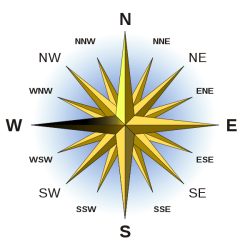West
West is a noun, adjective, or adverb indicating direction or geography.
West is one of the four cardinal directions or compass points. It is the opposite of east and is perpendicular to north and south.
To go west using a compass for navigation, one needs to set a bearing or azimuth of 270°.
West is the direction opposite that of the Earth's rotation on its axis, and is therefore the general direction towards which the Sun sets.
During the Cold War "the West" was often used to refer to the NATO camp as opposed to the Warsaw Pact and non-aligned nations. The expression survives, with an increasingly ambiguous meaning.
Moving continuously west is following a circle of latitude.
The word west is derived from the name of one of the four dwarves in Norse mythology, Norðri, Suðri, Austri and Vestri, who each represented one of the directions of the world.
Symbolic meanings
In Chinese Buddhism, the West represents movement toward the Buddha or enlightenment (see Journey to the West). The ancient Aztecs believed that the West was the realm of the great goddess of water, mist, and maize. In Ancient Egypt, the West was considered to be the portal to the netherworld, and is the cardinal direction regarded in connection with death, though not always with a negative connotation. Ancient Egyptians also believed that the Goddess Amunet was a personification of the West. The Celts believed that beyond the western sea off the edges of all maps lay the Otherworld, or Afterlife.
In American literature (e.g. in The Great Gatsby) moving West has sometimes symbolized gaining freedom, perhaps as an association with the settling of the Old West (see also Manifest Destiny).
